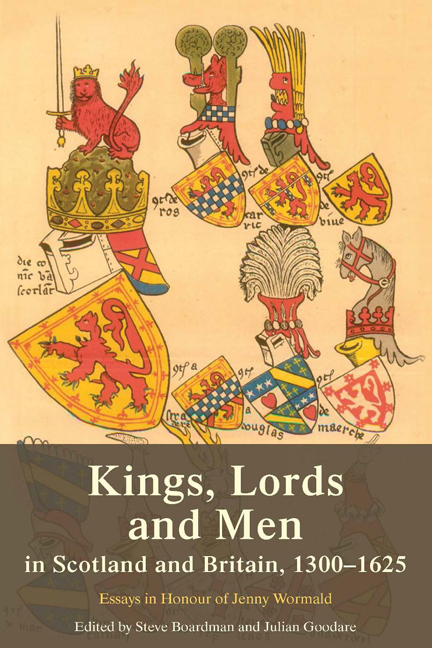Book contents
- Frontmatter
- Contents
- List of Illustrations
- Preface
- List of Abbreviations
- List of Contributors
- Introduction: Kings, Lords and Jenny Wormald
- 1 The Stewart Realm: Changing the Landscape
- Part I Lords and Men
- Part II Kings and Lords
- 9 Murder Will Out: Kingship, Kinship and Killing in Medieval Scotland
- 10 The Lanark Bond
- 11 James III: Kingship and Contested Reputation
- 12 Beyond the Declaration of Arbroath: Kingship, Counsel and Consent in Late Medieval and Early Modern Scotland
- 13 Royal Gifts and Gift-Exchange in Sixteenth-Century Anglo-Scottish Politics
- 14 The Ainslie Bond
- 15 ‘Scotland will be the Ending of all Empires’: Mr Thomas Murray and King James VI and I
- Publications of Jenny Wormald
- Index
12 - Beyond the Declaration of Arbroath: Kingship, Counsel and Consent in Late Medieval and Early Modern Scotland
from Part II - Kings and Lords
Published online by Cambridge University Press: 15 December 2017
- Frontmatter
- Contents
- List of Illustrations
- Preface
- List of Abbreviations
- List of Contributors
- Introduction: Kings, Lords and Jenny Wormald
- 1 The Stewart Realm: Changing the Landscape
- Part I Lords and Men
- Part II Kings and Lords
- 9 Murder Will Out: Kingship, Kinship and Killing in Medieval Scotland
- 10 The Lanark Bond
- 11 James III: Kingship and Contested Reputation
- 12 Beyond the Declaration of Arbroath: Kingship, Counsel and Consent in Late Medieval and Early Modern Scotland
- 13 Royal Gifts and Gift-Exchange in Sixteenth-Century Anglo-Scottish Politics
- 14 The Ainslie Bond
- 15 ‘Scotland will be the Ending of all Empires’: Mr Thomas Murray and King James VI and I
- Publications of Jenny Wormald
- Index
Summary
The Declaration of Arbroath of 1320 is a remarkable document. By any standards, it is a uniquely succinct and effective expression of medieval regnal solidarity under a monarch who reigns only on condition that he maintains the kingdom's freedom from foreign over-lordship. Addressed to Pope John XXII by ‘the barons, freeholders and the whole community of the realm of Scotland’, it begins with an account of the Scottish people's ancient origins, their early conversion to Christianity, and the cruelty of Edward I towards a kingdom made vulnerable by the crisis of a disputed kingship. It then goes on to say that the Scots have been set free by ‘our most valiant prince, king, and lord’, Robert Bruce, who ‘like another Maccabeus or Joshua’ has delivered Scotland out of the hands of its enemies and whose rule is sanctioned by divine providence, rightful succession, and ‘the due consent and assent of us all’. Yet, it proceeds, while King Robert's rule may be triply legitimate – sealed by God, hereditary right and the consent of the people – it is assuredly not unconditional. On the contrary, in an oft-quoted passage, it states that:
… if he [Robert] should give up what he has begun, seeking to make us or our kingdom subject to the king of England or the English, we would strive at once to drive him out as our enemy and a subverter of his own right and ours, and we would make some other man who was able to defend us our king. For as long as a hundred of us remain alive, we will never on any conditions be subjected to the lordship of the English. For we fight not for glory nor riches nor honours, but for freedom alone, which no good man gives up except with his life.
Even leaving aside the final Sallustian flourish, it is not surprising that the blend of patriotism and political radicalism that these lines encapsulate has become a focus of consuming pride to many modern Scots. Nor is it surprising that the Declaration is often taken to be an expression of a distinctively Scottish attitude to government – at once independent of foreign interference and accountable to the people – that has allegedly defined Scottish political culture from that day to this.
- Type
- Chapter
- Information
- Kings, Lords and Men in Scotland and Britain, 1300-1625Essays in Honour of Jenny Wormald, pp. 265 - 282Publisher: Edinburgh University PressPrint publication year: 2014



